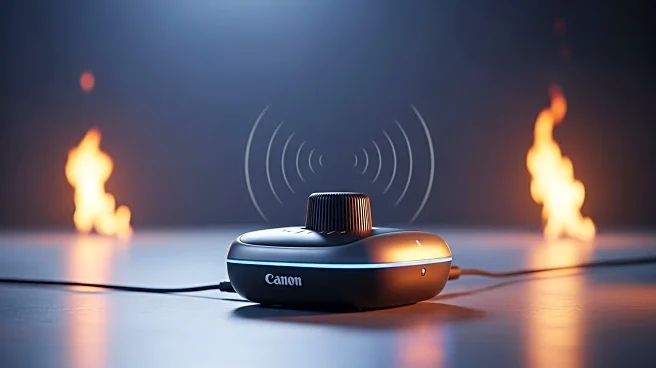What's Happening?
Sonic Fire Tech, a startup focused on wildfire defense, has introduced an innovative acoustic fire suppression system using infrasound technology. The system, which does not rely on water, uses a reciprocating
piston to generate infrasound, a frequency below human hearing, to extinguish flames. This technology is designed to protect homes from wildfires by activating when sensors detect flames, routing infrasound through ducts to suppress fires on rooftops and around homes. Sonic Fire Tech has secured $3.5 million in seed funding from investors such as Khosla Ventures and Third Sphere. The company is collaborating with utilities like PG&E and Southern California Edison for demonstrations and aims to certify its technology as a sprinkler replacement.
Why It's Important?
The development of infrasound technology for wildfire defense represents a significant advancement in fire suppression methods, particularly in areas where water is scarce. This innovation could transform how communities prepare for and respond to wildfires, potentially reducing property damage and saving lives. The technology offers a sustainable and efficient alternative to traditional fire suppression systems, addressing environmental concerns associated with water usage. As wildfires become more frequent and severe due to climate change, Sonic Fire Tech's solution could play a crucial role in enhancing community resilience and safety.
What's Next?
Sonic Fire Tech is working on obtaining certification for its infrasound technology as a replacement for traditional sprinkler systems. The company is conducting demonstrations with major utilities to showcase the effectiveness of its system. As the technology gains recognition, it may lead to broader adoption in wildfire-prone areas, influencing building codes and fire safety regulations. The success of Sonic Fire Tech's system could attract further investment and partnerships, driving innovation in the field of fire suppression and emergency preparedness.
Beyond the Headlines
The use of infrasound technology in wildfire defense raises interesting ethical and environmental considerations. It challenges traditional methods of fire suppression, prompting discussions on the balance between technological innovation and ecological impact. The adoption of such technology could lead to shifts in industry standards and practices, influencing how communities approach disaster preparedness. Additionally, the collaboration between startups and utilities highlights the importance of cross-sector partnerships in addressing complex environmental challenges.









